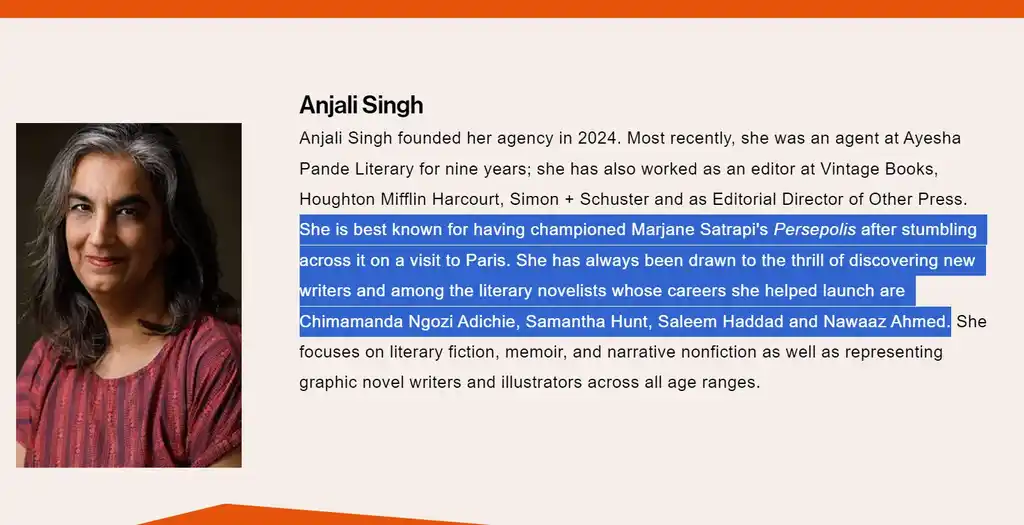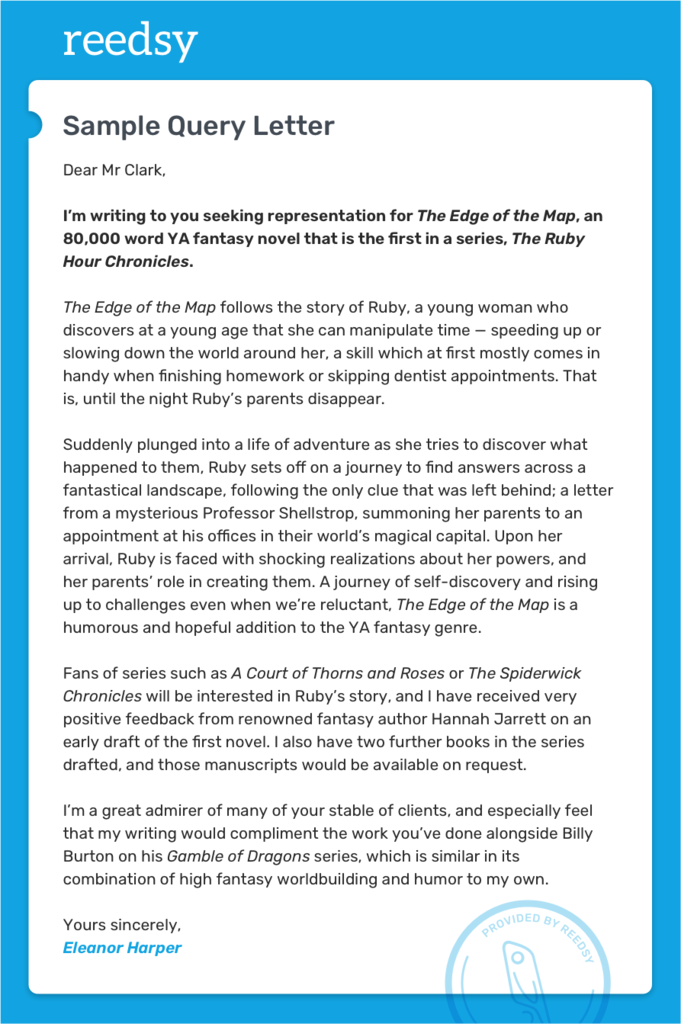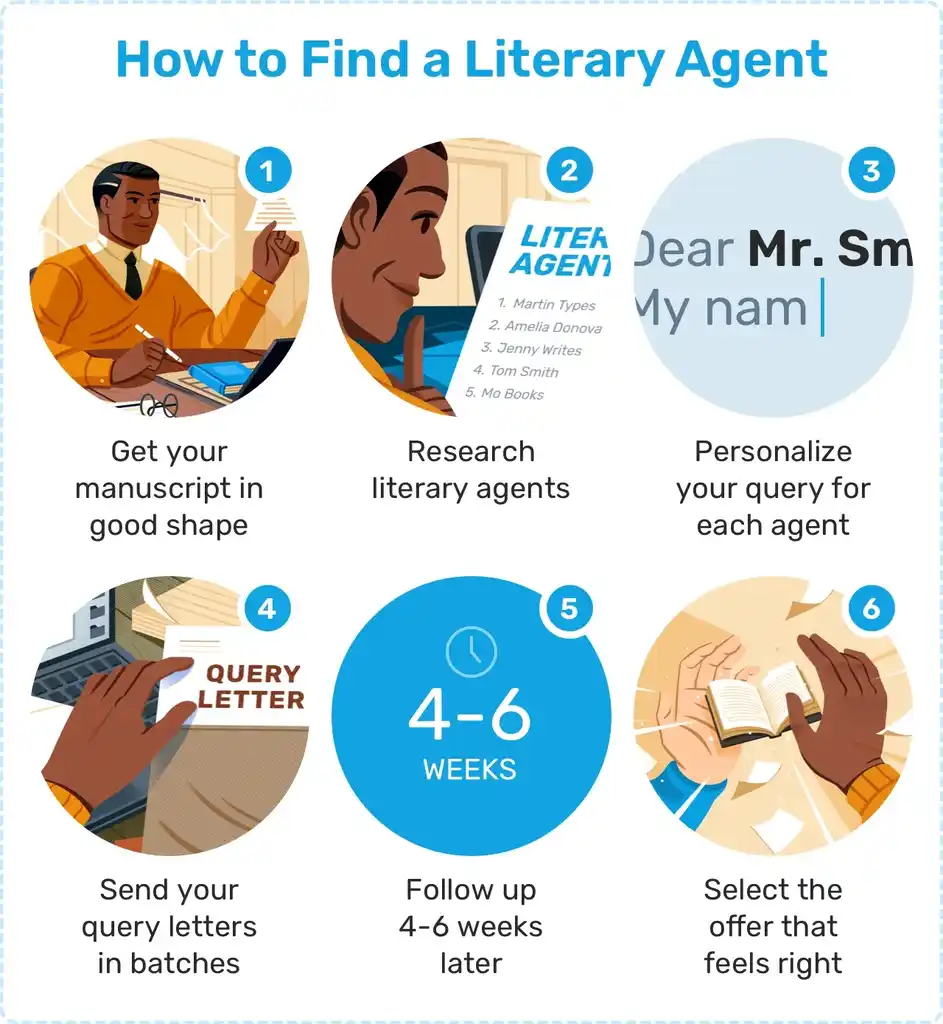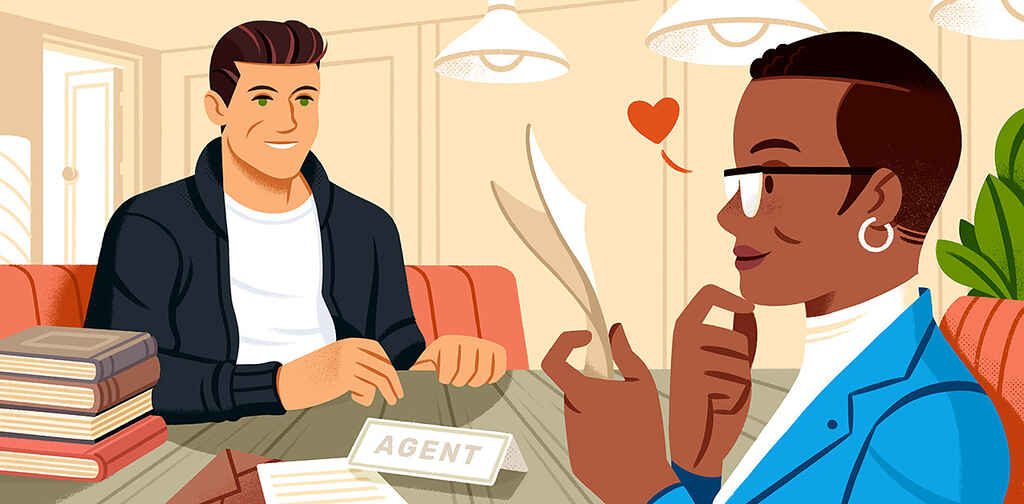Guides • Understanding Publishing
Last updated on Mar 13, 2024
How to Find a Literary Agent (+ List of Directories)
About the author
Reedsy's editorial team is a diverse group of industry experts devoted to helping authors write and publish beautiful books.
More about the Reedsy Editorial Team →Martin Cavannagh
Head of Content at Reedsy, Martin has spent over eight years helping writers turn their ambitions into reality. As a voice in the indie publishing space, he has written for a number of outlets and spoken at conferences, including the 2024 Writers Summit at the London Book Fair.
View profile →To secure a book deal with a traditional publishing house, you'll need to find a literary agent to represent you, as most publishers don't accept “unagented” submissions. To stand out in the slush pile and find an agent who will be a fervent advocate for your book, you’ll have to put in some work to carefully research their preferences and submission guidelines.
Here are 7 steps to get a literary agent to represent your book:
1. Browse literary agent directories
While agencies tend to be based in a few major cities like New York and London, it’s not like you can walk through the literary district of Manhattan and knock on doors. Luckily, there are several online directories where you can find the best literary agents who are currently seeking submissions.
|
Directory |
Description |
|
Reedsy Directory |
At Reedsy, we put together a free, extensive list of agents with all the important details about their agency, previous clients, preferred genres, and preferred contact methods.You can filter your search results by location and genre, and there’s even a checkbox you can click to help you find agents who are interested in debut authors. |
|
QueryTracker |
In addition to providing key information about hundreds of agents, this online directory lets users share details about their querying experiences, giving aspiring authors a more informed picture of what their potential agents are like, as well as their query habits. |
|
Publishers Marketplace |
With a paid membership, Publishers Marketplace will give you access to detailed databases to help you find and vet agents, agencies, editors, and imprints. |
|
Manuscript Wishlist (MSWL) |
MSWL was created to help writers connect with agents and editors seeking specific elements in submitted manuscripts. For example, in addition to their preferred genre, an agent can state that they’re looking for female-led stories and modern twists on traditional fairy tales. If you have a Twitter account, you can also check out the hashtag #MSWL to find potential agents there. |
Now that you know the best places to find a literary agent, let’s look at some practical querying tips that will increase your chances of scoring an agent, starting with your book’s commercial appeal.
🖋️
Are you ready for a literary agent?
Find out here! Takes one minute.
2. Know your book’s genre and market appeal
Since you’ll be spending a lot of time making a list of potential agents, you’ll need to have a good grasp of what your book really is to ensure that you find the best possible agent for you. Most agents will only read manuscripts in their preferred genres, so you should know the different book genres and subgenres out there, and how your book would be categorized.
Next, you’ll have to understand how your book can stand out within your genre.
What is your book's commercial appeal?
When it comes to commercial and genre fiction in traditional publishing, a well-written story is not enough — there needs to be something marketable in the story to convince publishers to take a chance and eventually offer a book deal.
While there’s no definite strategy to know your book’s commercial appeal, we suggest spending time analyzing bookstores and online retailers to look for comp titles 一 books that fall in the same category as yours. You can also check out online resources such as Publisher Weekly’s Deals of the Week; The Bookseller’s Book News; Publishers Marketplace’s Latest Deals page; and Literary Hub’s Book Marks for new book reviews.
Once you clearly understand your book’s market potential, the next step is to find the agents who are already looking for it.
3. Look for agents representing books like yours
Browse the online directories mentioned above and begin shortlisting agents who are a good fit for your book. Luckily, most directories allow you to filter agents by the genres they represent.
You can develop your own system to keep track of your picks, but we recommend using a simple spreadsheet listing agent names, emails, any special guidelines, the date when you contacted them, and whether you’ve followed up.
Shortlist more agents than you think you need
Your shortlist doesn’t need to be tight. In fact, as New York Times-bestselling author and Reedsy editor Caroline Leavitt recommends, you should pick out at least 50 to 60 agents to query as you’ll likely face many rejections on the way (don’t take it personally, it’s just the nature of the game). That said, only add to your list candidates who are potentially a good fit — not just any agent who has previously represented impressive clients.
Here are some other criteria for adding an agent to your shortlist:
Check their existing client lists
Take a look at every candidate’s agency website to see who they currently represent. Reedsy editor and experienced agent Melissa Richeson tells us that “looking at an agent’s current client list is a great way to get a sense of their tastes.”
However, Melissa also warns that your work might be rejected if it’s too similar to one of the authors on their list: “Most agents don’t want to sign a new author who would compete against one of their current authors.”
Similarities, in other words, are good — but not if you’re stepping into the exact same literary space.
They’re currently open to queries
To catch up with submissions, agents sometimes stop accepting new queries for a while. Make sure to check whether your candidates are currently open to queries — their websites should clearly indicate this.
They represent different agencies
Reedsy editor and literary agent Sally Apokedak advises that you pick one agent per agency: “Most agencies consider a pass from one agent to be a pass from the agency. You may send a different manuscript to a new agent, but don't send the same work to more than one agent per agency.”
On the flip side, Sally also mentions that promising manuscripts are often passed along internally within an agency, so you might still get your work in front of other agents anyway.
After a first selection of literary agents, dig deeper into their preferences…
4. Research and vet your shortlist
After you’ve finalized your shortlist, don’t forget to go the extra mile to make sure everyone is reputable — the last thing you’d want is to waste time on agents who aren’t the real deal!
What’s their sales record?
One way to vet your shortlist is to check their deals history. From the directories or their agency website, check their client list and publishers they’ve sold their work to. Are they the kind of publishers you’d hope to sell your book to? If not, it may be better to pass.

An example of an agent’s profile listing her previous clients. Screengrab: anjalisinghagency.com
What are they like to work with?
If you want to get along well with your agent and develop an amicable relationship, consider doing some research to find out what they’re like to work with. Websites like QueryTracker and forums on platforms such as Reddit are good places to find out how promptly (and kindly) agents respond to submissions.
Should you take a chance on a new agent?
New agents shouldn’t necessarily be written off right away. If you’ve done your research and can confirm they’re reputable, it could be worth contacting at least a few, especially if they work for a well-established literary agency or were previously editors.
Keep in mind that new agents don’t have as much experience as established ones, so they might be less knowledgeable about negotiations involving finances and contracts. But since they're hungry to build their list of clients, they'd be more motivated to help you find a great publisher. Additionally, with fewer clients than, say, your dream agent, they might be more likely to help you improve your current manuscript, come up with ideas for your next book, and more.
Let’s now focus on the pitch itself, your query letter…
5. Send personalized query letters
The next step of the process involves sending a query letter to each agent of interest, introducing you and your book. Agents have to read countless letters, so make sure you stand out by following all agency guidelines and personalizing your query to each agent.
If you aren’t sure what a query letter looks like, head to our practical guide on query letters next — it’ll help you craft a query letter that gets the important stuff right, including:
- A hook to grab the agent’s attention;
- Your book synopsis;
- Your author background and credentials;
- Your book’s commercial appeal and comp titles;
- A personalization for each agent.

(Click here to enlarge)
Always check what submission materials they want
Remember that not all agents are the same. Some have additional submission requirements that you’ll need to double-check before reaching out. While many agents solely require a query letter, a brief synopsis, and basic details about you and your book, others may ask for a short elevator pitch or the first 10,000 words of your manuscript, among other documents.
Avoid basic query pitfalls
Before you submit or send over anything, ask the following questions to ensure you’ve avoided the most mistakes:
- Have I addressed the right person, and have I spelled their name correctly?
- Have I followed all of the agent’s submission guidelines?
- Have I proofread all of my materials? Have all grammatical errors, typos, etc., been addressed?
- Are all my materials within the specified word count?
- Do all the comp titles I’ve listed make sense? Are they strong examples that will pique the agent’s interest?
- Does my query letter have a strong opening sentence that will hook the agent?
- Is my manuscript 100% ready to be looked at?
Send your queries in batches
It’s good practice to send your personalized queries out in batches. Aim to send 15 of them first — that way, if you receive any feedback, you’ll have the chance to refine your approach before contacting further agents.
Three things can happen once you’ve sent your first wave of queries out:
- They’ll reject your query;
- They’ll request a partial or full manuscript for fiction queries, or a book proposal if you’re querying nonfiction; or
- You’ll never hear back from that agent.
This brings us to the next point: learning how to deal with the agents’ responses (or lack thereof).

6. Deal with requests and rejections (and silence)
Often, an agent’s submission guidelines will state how long you can expect to wait for a response from them. In many cases, they’ll even tell you how many weeks to wait before you follow up.
Personalized rejections are actually good!
Most rejections are polite boilerplate rejections sent out by busy assistants. Occasionally, you may get a personalized response — one that notes an element of your work the agent was intrigued by, as well as any weaknesses that stopped them from taking your query to the next step.
Personalized rejections can hurt — it’s not fun to get that “almost, but not quite there” feeling, but getting this type of feedback is actually quite rare. If an agent takes time out of their busy day to drop you an encouraging note along with their rejection, appreciate that as a positive thing.
Standard rejections aren’t all bad news
Standard rejections are very, very common — so try not to let a growing pile of rejection letters (well, emails) change your sense of your work’s worth. All it takes is one person to like your idea. Douglas Stuart’s Booker-winning novel Shuggie Bain only received a single publishing offer. Would you not see that as a success? Don’t give up yet.
If, however, you have reason to believe that your query letter needs more work, see if you can improve it before contacting any more agents. If you want an experienced pair of eyes to help you past this roadblock, you may consider hiring an editor to critique your query letter.
Hire an editor to improve your query letter
Louise S.
Available to hire
A detail-oriented proofreader with experience in basic copyediting. I specialize in fiction, creative non-fiction, and memoirs.
John B.
Available to hire
I specialize in children's books because kids will be your best critics and biggest fans -- next to a good editor.
Auriane D.
Available to hire
Fiction editor with 8+ years experience ▪ Published Author ▪ English Teacher ▪ MFA in Creative Writing ▪ MA in English Lit
Silence is the new “no”
Reedsy editor and former literary agent Fran Lebowitz (who represented Julia Quinn of Bridgerton fame) tells us that there are a few ways of looking at not hearing from an agent: “One is the ever-delightful ‘Silence is the new no.’ Another is, well, if they are already saying no, my slightly goofy, slightly annoying follow-up really doesn't change that fact.”
It’s true that some authors don’t love the idea of following up — after all, if an agent was enthralled by your letter, they’d rush to get in touch, right? To some extent, that’s true, but it’s also true that emails can fall through the cracks, so if you really want to make sure your query was seen by an agent, a short and polite follow-up is never frowned upon.

Fran shares that in a follow-up email, it's always best to “just be quick and fairly neutral. Self-deprecation is often unbecoming and self-fulfilling.” For those who have not yet submitted a manuscript request, she recommends a follow-up along these lines:
As I figure out my next steps, I am wondering if you had a chance to consider my query letter (see below). If I don't hear back, I'll assume it's a “no.”
If they’ve already requested a manuscript sample, remind them of that — Fran suggests keeping the same notion of “I'm organizing my publishing plans…:”
I’m hoping you are enjoying the manuscript and understand if you need more time. If you have an idea of when I might hear back, please let me know.
Now that you know what to expect after sending your queries, let’s talk about what to do if you hear back with positive news…
7. Pick the agent that’s right for you
If you’ve sent your manuscript or book proposal to interested agents and received one or multiple offers, congratulations! You should be very, very proud of your hard work.
What comes next? Interested agents will tell you their plans for how they might help develop your book and career, and then they’ll offer you representation. Exciting, right? But before you rush to sign a contract, make sure they’re the right one for you. You can even send a last-minute follow-up to your dream agent, if any, to let them know you’ve had an offer and confirm that they aren’t interested — but don’t keep the agent(s) who made you an offer waiting for too long.
Passion and enthusiasm are worth their weight in gold
If you're lucky enough to get several offers of representation, the advice of award-winning author and Reedsy editor David Haviland would be to go with the agent who seems most invested in you and your work.
“It may be tempting to go with a more established or prestigious agent, but generally, those agents already have lots of major clients, who are likely to be their priority. The ideal choice is often a newer agent, with fewer clients, who is keen to make their mark."
Be wary of fake agents
Agents found on reliable directories or through word-of-mouth recommendations are generally legitimate, respected professionals — but on the internet, you might come across people you aren’t sure you should trust.
No matter what, avoid anyone who asks for an upfront fee — an agent who asks for any preemptive payment is not legitimate.
🙅♀️Worried you can’t identify scammy behavior? Our guide to publishing scams has you covered — or you can take our 1-minute quiz below.
Self-publishing can be a great option
Many successful authors struggled to publish their first books, so don’t lose faith. This list of the most rejected books of all time on Literary Hub might help — to give you a sense of who else received a bunch of rejections, the list includes Kathryn Stockett’s The Help, Samuel Beckett’s debut novel Murphy, and Stephen King’s Carrie.
If you want to learn more about self-publishing, check out our detailed guide on the topic.
Be thorough in your search, stay candid, and don’t rush into any decisions. Since you only get one shot when you're querying an agent, ensure you get it right. Chances are that you’ll experience some setbacks when querying, but if you remain patient and determined, you'll find your long-term business partner and creative kindred spirit sooner rather than later.

